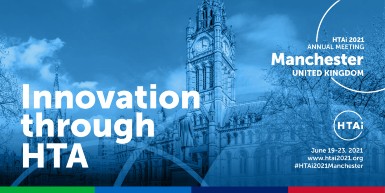National Institute for Health and Clinical Excellence (NICE)
|
|
World Evidence-Based Healthcare Day: Using evidence to inform our recommendations
Martin discusses World Evidence-Based Healthcare Day and how NICE uses evidence to inform our recommendations.
Dr Martin Allaby, consultant clinical adviser in NICE’s Centre for Guidelines
Dr Martin Allaby is a consultant clinical adviser in NICE’s Centre for Guidelines. Martin discusses World Evidence-Based Healthcare Day and how NICE uses evidence to inform our recommendations.
World Evidence-Based Healthcare Day takes place on Tuesday 20 October 2020. NICE is an official partner in this global initiative. But what do we mean by ‘evidence-based’ and why is it important to work in this way?
Being evidence-based is about objectivity. Most people would agree that this is important. And yet, around the world, adopting such an approach is under threat. Starting with a particular answer and then seeking out evidence to support your conclusion is not uncommon. But this ‘false truth’ is something that our global community of researchers, academics, students, clinicians, consumers, patients and other agents of change must guard against.
Our approach
At NICE, we start with a question. Our independent committees are made up of health and care professionals, people who use services, and carers. At the outset of guidance production, they agree review questions important to the topic area. This could be because people are not sure what to do in a particular area of clinical practice. For example, one of the review questions we are currently seeking to answer as part of our guideline update on Caesarean section is: ‘Are opioids safe and effective for pain management after caesarean birth?’
We then find the best available evidence to answer the committee’s questions. We appraise the studies using a quality assessment system called GRADE. This categorises the quality of the evidence as
- high
- intermediate
- low
- very low.
Interpretation is key
One of the aims of World Evidence-Based Healthcare Day is to highlight the need for better evidence to inform healthcare policy, practice and decision making. When you’ve overseen the production of as many clinical guidelines as I have, you come to realise that for around half of the review questions we pose, the quality of the evidence that comes back is either low, very low, or there is no evidence at all that meets the search criteria.
This is one of the reasons why our guidance and quality standards are all developed by independent committees. Interpretation of the evidence is key. This difficult task is especially important if professional consensus within the clinical community is at odds with the findings of low or very low-quality evidence.
The fight against COVID-19
This year, COVID-19 has highlighted the importance of using the best available evidence. Here at NICE, we developed our COVID-19 rapid guidelines at speed, using a different process to normal. But our commitment to evidence-based decision making meant we did not compromise on our core principles. Although our timelines reduced, our interim process still included:
- a scope (what a piece of guidance will and will not cover)
- working with experts
- drawing on what little evidence there was
- consultation
- rapid updates as new evidence emerges.
The guidelines have been well received and working in such an agile and responsive way has certainly boosted our reputation. This goes to show that in times of global crisis, establishing objectivity is more important than ever.
Find out more
If you’d like to learn more about our COVID-19 rapid guideline programme, join our free webinar: ‘Relevant, timely and evidence based – exploring what it takes to deliver guidance to a health and care system dealing with COVID-19’. It’s on Monday 19 October, 12:30pm to 1:30pm.
We’ll be exploring:
- how NICE guidance was used to ensure the effective and safe treatment of patients at the height of the pandemic
- the impact this will have on the way we produce future guidance
- how NICE intends to work with the system to meet the ongoing challenges posed by COVID-19.
Original article link: https://www.nice.org.uk/news/blog/world-evidence-based-healthcare-day-using-evidence-to-inform-our-recommendations



